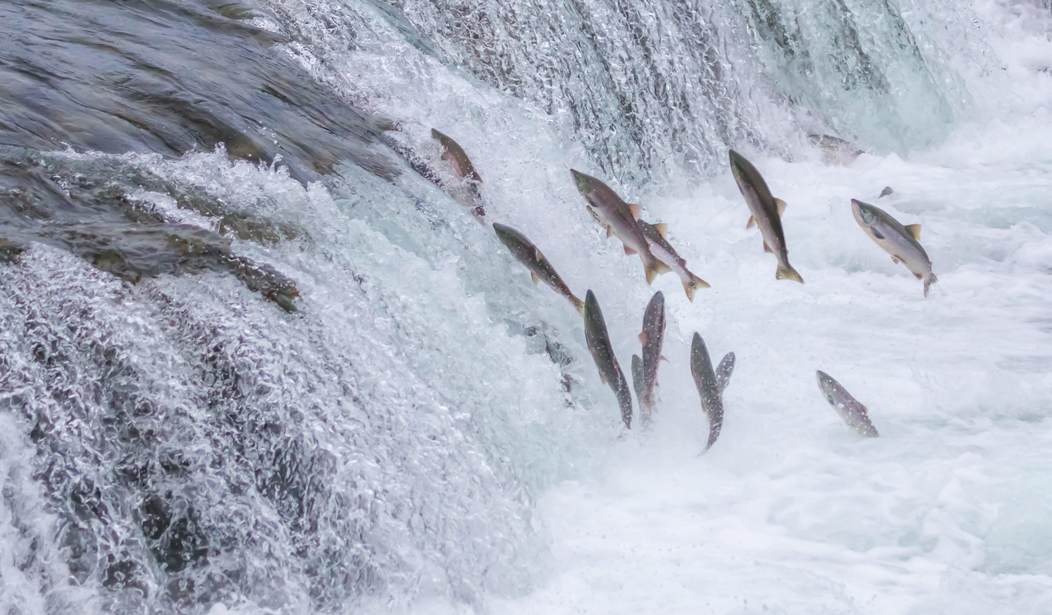Salmon spawning in America’s great Northwest is nothing but a brief, fleeting romance that is always followed by death.
However, the annual rite of watery reproduction is at the heart of a legal battle being waged by a small group of gold miners who are trying to stop Oregon from doing to them what California environmentalists have already accomplished.
The miners have filed suit to overturn new rules in Oregon that would ban the machines they use for suction dredge mining to harvest gold from the bottoms of riverbeds.
If the miners succeed, environmentalist groups say the world of the salmon will be worse off for it.
The new rules in Oregon, slated to go into effect in 2016, would mirror California regulations the miners are already fighting in court.
The miners said in documents filed in October with the U.S. District Court in Medford, Ore., that Oregon’s ban on suction dredge mining machines would violate federal laws that have promised miners access to U.S. lands since 1847.
Nick Cady, the legal director of Cascadia Wildlands, a conservation group that joined the effort to intervene in the miners’ lawsuit Nov. 20, said the argument that gold miners should be protected by an “antiquated right to mine” law from the 1800s is “simply ridiculous.”
“We are defending the state of Oregon and the choice by its residents to protect iconic waterways and scenic rivers from damaging mining practices,” said Cady.
The Western Mining Alliance, which bills itself as the voice of the independent miner, claims on its website that suction dredging for gold does absolutely no harm to the environment.
The WMA argued the miners use small machines that only move a few cubic yards of gravel per day from the bottom of a river, and then after it is shifted for gold put the gravel right back in the same spot from where it was taken.
Seems harmless enough, but the way the WMA sees it the problem is that the environmentalists who pushed similar regulations through the California Legislature just don’t understand the suction dredging process.
“A bill prepared by the Sierra Fund and handed off to a representative from Beverly Hills who has never seen a gold dredge, but did the Sierra Fund’s bidding all the same,” is how the California legislative process was described in the Western Mining Alliance October 2015 newsletter.
Jonathan Evans, the environmental health director of the Center for Biological Diversity, said environmentalists know very well how suction dredge mining works. And they do not see it as benign as the miners would have fellow Oregonians believe.
He also ripped the idea that suction dredge mining doesn’t hurt the environment.
Evans said rather then the genial, responsible removal and replacement of gravel from a river bottom, suction dredge mining actually clears riparian vegetation important for keeping streams cool for salmon survival, increases erosion, damages streamside wetlands and alters the floodplain.
“Suction dredge mining pollutes our waterways with toxic mercury, clouds streams with sediment, hurts endangered fish and wildlife and destroys cultural resources,” Evans said.
It isn’t just environmentalists who are against the gold miners in the fight over Oregon Senate Bill 838.
A number of commercial and recreational organizations have also expressed concerns that suction dredge and other motorized mining practices are disruptive and harmful to fishing, an industry that generates approximately $780 million a year in spending in Oregon.
“Letting a handful of people suck up whole river bottoms looking for flecks of gold makes no economic sense, since it destroys salmon habitat and just puts more commercial fishing families out of work,” said Glen Spain of the Pacific Coast Federation of Fishermen’s Associations, a major commercial fishing industry group that is also intervening in the lawsuit.
The consortium of miners suing to block the Oregon law from taking effect Jan. 1 are also fighting California regulations, approved in 2009, which would block suction dredge mining. In that fight, the miners have scored a small victory. Lower court judges have sent the miners’ suit to the California Supreme Court, which has agreed to hear it.
Tom Kitchar, president of Waldo Mining District, an organization that is bankrolling the miners’ legal action, told Reuters the environmental groups are promoting rigid restrictions based on incomplete scientific research, and that the ban on motorized devices impacts equipment other than suction dredge gear.
He also said the new regulations reflect ignorance about mining practices dating back to the 1850s, when people drawn to California for the 1848 gold rush turned their attention north toward Oregon.
“Can the state regulate mining?” said Kitchar, pointing to the 1847 guarantee of federal mining rights. “Yes, on state land and state-controlled waters, but not on federal land.”
Or put more succinctly, Kitchar said of the regulatory effort, “It’s crap.”









Join the conversation as a VIP Member